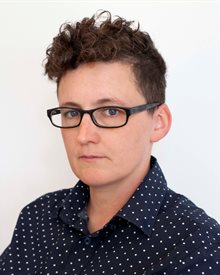Mo Moulton

I am a Senior Lecturer in the Department of History. I use they/their/them pronouns and describe myself as queer, trans, and nonbinary. For me the term ‘queer’ indicates non-heterosexual, non-normative sexuality. I think of it as an umbrella term that can cover a lot and be gender inclusive too. I helped to create the College of Arts & Law Trans Support Network -- look us up and say hello! My research focuses on Britain and Ireland in the early 20th century; I'm especially interested in how minorities and marginalization works in different aspects of society and culture. I use queer theory and postcolonial theory as reference points for my work. My first book was on the impact of Irish independence (1922) on England, and my second book is on a group of friends centered around detective novelist Dorothy L. Sayers.
I believe that LGBTQ staff profiles are useful for people to get a sense of the range of terms that people use to describe themselves. This can be confusing within the community and beyond because terms are constantly evolving. I also remember when I was in University myself, one of early movements that academics made was to start putting stickers on doors to say that this is a safe space for LGBT people. I remember how much this meant to me as a student who had no clue how to tell if somebody was queer or if they were safe to approach. So, it is a way of making it something that it is not whispered about or that people are ashamed of.
In my workplace, I have always been open about my sexual orientation and gender identity. Having been born in New York and having grown up mostly in Massachusetts, I can see that there are differences between American and British cultures regarding coming out at work. In the UK, I feel that there are boundaries in what people talk about from their personal life, in general. People tend to be more private. And so sometimes I have to remember that that’s a general cultural difference and it does not necessarily mean that somebody is closeted or homophobic.
I think that the workplace culture should be one that allows people to be open about their sexual orientation. In my experience, straight people come out all the time. I remember co-teaching a class with a really lovely colleague and in the first fifteen minutes of the seminar she referred to her husband. There was no reason for her not to bring that up, since it was relevant to the topic, but she did not think about it for a minute - whereas many LGBTQ lecturers have to laboriously think about when and in what context they will come out in front of the students.
My experience so far has been that the University of Birmingham is an LGBTQ friendly institution. The Rainbow Network was mentioned to me as soon as I joined the University and I can frequently see gestures of inclusion from my colleagues. There are perhaps two areas where the University needs some improvement. One is the provision of more gender-neutral toilets and the other one is broader incorporation of teaching about LGBTQ identities and history in the curriculum. But generally, I think that the University has always felt a very welcoming place for me.